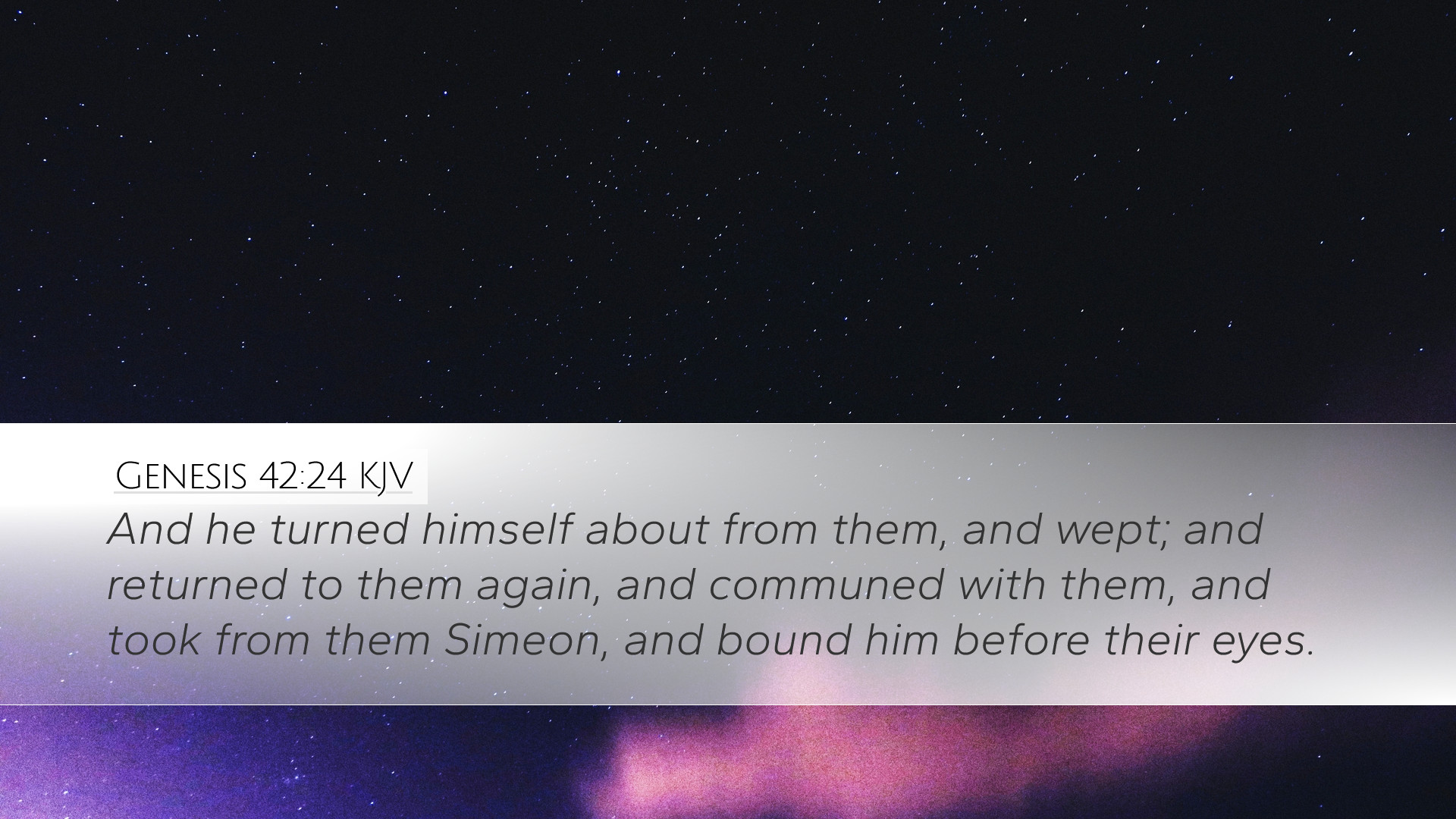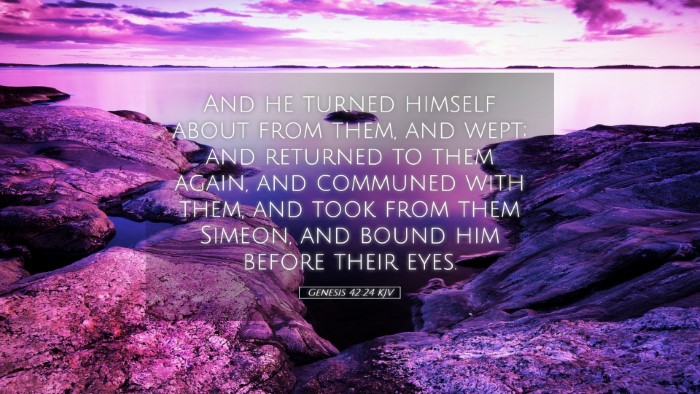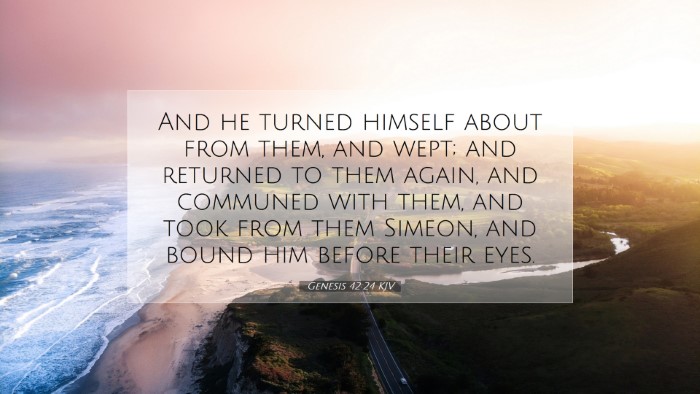Commentary on Genesis 42:24
Bible Verse: "And he turned himself about from them, and wept; and returned to them again, and communed with them, and took from them Simeon, and bound him before their eyes." (Genesis 42:24)
Introduction
Genesis 42:24 provides a poignant glimpse into the emotional state of Joseph as he interacts with his brothers, who had betrayed him years prior. This verse captures a pivotal moment in the narrative where Joseph subtly reveals his identity and the depth of his feelings towards his family's betrayal. Several public domain commentaries shed light on the significance of this verse, helping pastors, students, theologians, and Bible scholars to grasp the rich theological and personal implications contained within it.
Contextual Overview
This account occurs during the time of famine when Joseph's brothers arrive in Egypt to buy grain. Joseph, now a powerful figure in Egypt, recognizes them but conceals his identity. The tension between the brothers, shaped by their past sins and Joseph's newfound authority, lays the groundwork for the emotional intensity captured in verse 24.
Commentary Insights
Matthew Henry’s Commentary
Matthew Henry highlights the profound emotions that Joseph experiences in this verse. He notes that Joseph’s act of turning away to weep demonstrates a deep inner struggle, torn between his feelings for his brothers and the pain of their past actions. Henry emphasizes that Joseph's tears signify not only his sorrow but also a profound sense of compassion for those who had wronged him. This emotional response is framed within the broader theme of forgiveness and redemption, suggesting that the work of restoration involves deep emotional engagement.
Albert Barnes’ Commentary
Albert Barnes provides a detailed exploration of the implications of Joseph binding Simeon. He explains that this act serves dual purposes: as a means of protecting his brothers and as a means of testing their characters. Barnes argues that Joseph’s actions are deliberate, aiming to evoke a sense of remorse and reflection in his brothers. He posits that Joseph’s weeping reflects not only personal hurt but also the weight of familial responsibility, as Joseph wrestles with his identity and the desire for reconciliation. This moment becomes a crucial intersection of guilt, brotherhood, and the journey toward restoration.
Adam Clarke’s Commentary
Adam Clarke delves into the Hebrew implications of the text, highlighting that the phrase "turned himself about" indicates a need for Joseph to momentarily withdraw in order to process his emotions. Clarke suggests that Joseph's weeping illustrates his compassion, empathy, and the overwhelming weight of his past experiences. He notes that the binding of Simeon serves as both a necessity for the narrative and a symbolic gesture of the brothers' own bond and the consequences of their actions. Clarke stresses the importance of understanding the broader picture of God's providence in the lives of individuals during times of distress and famine, revealing how personal emotions often intertwine with divine purpose.
Theological Implications
The emotional turmoil experienced by Joseph is crucial for understanding themes of forgiveness, reconciliation, and divine providence. Each commentary suggests that Joseph’s response embodies profound theological truths, including the necessity of emotional processing before true reconciliation can occur. This aspect of human experience—combining pain with the hope of restoration—is a vital lesson for believers who seek to navigate their own relationships imbued with conflict.
Forgiveness and the Path to Restoration
The act of weeping signifies a moment of vulnerability for Joseph, reminding the reader of the importance of acknowledging pain before pursuing reconciliation. Forgiveness does not dismiss past transgressions but addresses them within the context of divine grace. For pastors and counselors, this passage offers a model for addressing relational strife with empathy and compassion, illustrating that the path to healing is often fraught with emotional complexity.
Divine Providence in Human Affairs
Joseph's circumstances unfold in a manner that showcases the overarching theme of providence throughout Genesis. The emotion he displays is not only rooted in personal grief but also reflects the larger narrative of God's sovereignty in the midst of human actions. Readers are reminded that even in moments of distress, God’s plans are at work, often bringing about restoration through painful experiences. This serves as an essential reminder for theologians and scholars to study how personal narratives within Scripture converge with divine intention.
Conclusion
Genesis 42:24 holds significant weight in understanding Joseph’s complex emotions and the themes of forgiveness, reconciliation, and divine providence. The insights provided by Matthew Henry, Albert Barnes, and Adam Clarke combine to enrich our understanding of this pivotal moment in Joseph's life—a moment marked by tears, introspection, and the hope of future reconciliation with his family. For pastors, students, and scholars alike, this verse invites deeper reflection on the nature of human relationships and the transformative power of grace in the face of past transgressions.


